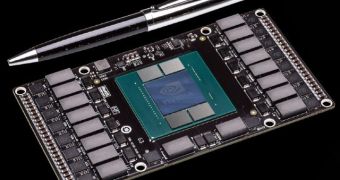3DCenter.org has received information that the first Pascal-based silicon GPU from Nvidia has already been taped out. Called GP100, this new chip will be the successor to the present GM 200 found in today's Nvidia graphic cards, like GTX 980, GTX 980Ti and Titan X.
Taping out means manufacturing the first tiny quantity of working prototypes of a certain new technology in order for it to be tested and improved before being launched. Usually, this is seen as a major milestone in the development cycle.
The much-awaited announcement of AMD's first Fiji HBM GPU later this June has probably prompted Nvidia to step up its Pascal architecture development and pole-vault AMD's HBM technology, getting straight to HBM 2. This major jump is meant to shadow AMD's launch and give designers and game developers, from the start, 32 GB of video memory to tap into.
According to 3DCenter.org, the GP100 may feature between 4,500 and 6,000 Cuda cores. The chip will be built on TSMC's future 16 nanometer silicon fabrication process, which will probably come out in 2016. Also, it seems that the GP104, the successor to GM204, will be launched between Q2 and Q3 2016.
Loud and clear
The message sent by AMD this year at Computex has been received by Nvidia, and the prospect of having its Titan X quickly outclassed by the end of the year by AMD's next HBM GPU technology is chilling enough to start working at its mostly rumored, by now, Pascal future technology.
Although AMD is working in tandem with its Radeon 300 line and its future Tonga 384-bit bus GPU to beat Nvidia's Titan X, the real battle lies in the stratosphere of graphic cards development where the High Bandwidth Memory architecture is waiting to be harnessed by the two tech giants.
It remains to be seen who will win on the long run, but this time in years AMD finally has an upper hand in delivering bleeding-edge GPU architecture to the public, long before Nvidia could counter it with something relevant. And when it does, AMD should be prepared because it risks being outclassed. Exponentially.

 14 DAY TRIAL //
14 DAY TRIAL //